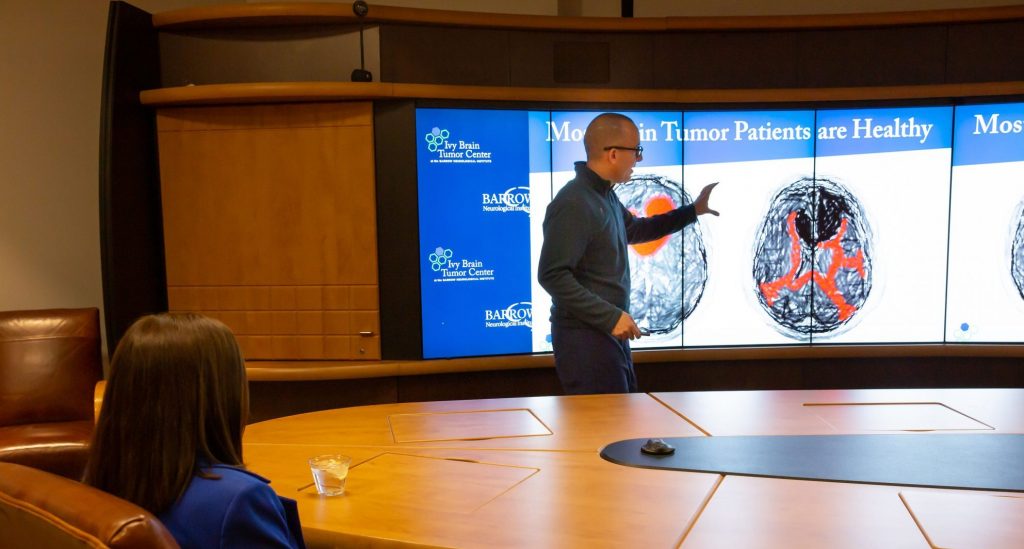Glioblastoma is the most common and aggressive form of brain cancer with over 12,000 new cases a year and a 16-month median survival rate. Due to the complexity and unique nature of this disease, little progress has been made to find new and effective treatment options.
This grim reality hit home in Arizona when Sen. John McCain was diagnosed with glioblastoma in July of 2017. As someone whose resilient spirit had been the hallmark of their public image after countless close calls with death, the country watched with grief as McCain’s health deteriorated at a rapid pace. Even with access to the best healthcare in the world, the senator wouldn’t even make it to the median survival rate having lost his battle a little over a year after his diagnosis.
McCain’s passing prompted government leaders to take action. In Arizona, where his death sent shockwaves throughout the state, community officials took a newfound interest in the research being done to help brain cancer patients, specifically the groundbreaking Phase 0 clinical trials being conducted right in their own backyard at the Ivy Brain Tumor Center at Barrow Neurological Institute.
Glioblastoma Awareness Day
U.S. Sens. Martha McSally and Kyrsten Sinema of Arizona toured the Ivy Brain Tumor Center and after learning about the unconventional method their researchers are taking to treat aggressive brain tumors, both left with a general consensus: more needs to be done to bring awareness to glioblastoma and accelerate research. Shortly after each of their visits, the Arizona senators joined forces with other prominent senate members and unanimously passed a bi-partisan resolution designating July 17, 2019 as the inaugural Glioblastoma Awareness Day (GBM Day). Observed as a day to honor those who have been impacted by the disease, the initiative also supports efforts to develop better treatment options that will improve patients’ long-term prognosis.

The response was overwhelming with scores of individuals and families contributing to the Glioblastoma Awareness Day campaign, enabling the Barrow Neurological Foundation to raise a grand total of $539,044. The success of the first year encouraged those same leaders to come together once again to show their unwavering support to move the needle on brain tumor research and announced this year’s Glioblastoma Awareness Day will be on Wednesday, July 22, 2020.
Arizona Leads The Charge in Brain Cancer Treatment
Even before the passing of Sen. John McCain, Arizona had been at the forefront of brain cancer research. Located in the heart of Phoenix, the nationally-recognized Barrow Neurological Institute treats the largest volume of brain tumor patients than anywhere else in the country and the Ivy Foundation in Scottsdale is the largest privately funded brain cancer research foundation in North America having dedicated over $100 million since 2005. Both entities have become instrumental in the design and implementation of one of the most ambitious programs to treat aggressive brain tumors, Ivy Phase 0 clinical trials.
The Ivy Center’s Phase 0 clinical trials program is the largest of its kind in the world and enables personalized care in a fraction of the time and cost associated with traditional drug development. Unlike conventional clinical trials focusing on single drugs, its accelerated trials program tests therapeutic combinations matched to individual patients. Ivy Phase 0 clinical trials are challenging the status quo and giving hope to brain tumor patients now more than ever.
Pandemic or Not, the Fight Continues
Throughout the COVID-19 pandemic, universities and medical centers have shuttered their doors, closed crucial cancer studies, suspended clinical trials, and postponed surgeries. At the Ivy Center, brain cancer research continues to be top priority. The Center has screened a record number of patients, received FDA-approval on three new clinical trials, two of which launched in May and June, and has continued to grow by hiring some of the brightest minds in the field. Brain cancer doesn’t stop during a pandemic and for those being impacted by this disease, new and experimental treatment options may be their only hope.
As Glioblastoma Awareness Day approaches, in the midst of a global health crisis, it’s important to acknowledge how far research has come and how far it has yet to go. We hope you will join the Ivy Brain Tumor Center and countless others who will be honoring #GBMDay on Wednesday, July 22. The support of research development and new treatment options will help thousands of people in their quest to overcome this disease. To learn more about the groundbreaking brain tumor research being done in Arizona, visit the Ivy Brain Tumor Center’s website.
Melinda Langdon is the director of communications at the Ivy Brain Tumor Center at Barrow Neurological Institute, a non-profit translational research program in Phoenix, AZ that employs a bold, early-phase clinical trials strategy to identify new treatments for aggressive brain tumors, including glioblastoma.
This story was originally published at Chamber Business News.




